Case Study: Knowledge Management Initiative at Microsoft - Report
VerifiedAdded on 2022/08/20
|12
|2690
|10
Report
AI Summary
This report provides a comprehensive analysis of Microsoft's knowledge management (KM) initiative. It begins with an overview of Microsoft, highlighting the opportunities KM presented. The report then details the nature of the KM initiative, including the development of an online system for employee competency, the emphasis on knowledge sharing, and the use of various platforms like Microsoft SharePoint, breakfast meetings, and conferences to foster knowledge exchange. The analysis further examines the difficulties Microsoft faced during the implementation of the KM system, such as the challenges of duplication of effort, information leaks, motivating participation, measuring knowledge contribution, ensuring security, keeping information up-to-date and relevant, and data interpretation. Finally, the report assesses the success of the KM initiative, emphasizing the benefits to employees through training and knowledge sharing, and the use of feedback to improve the process. The report concludes that Microsoft's KM initiative has been successful in creating a well-developed knowledge management system and fostering a culture of continuous learning and improvement.
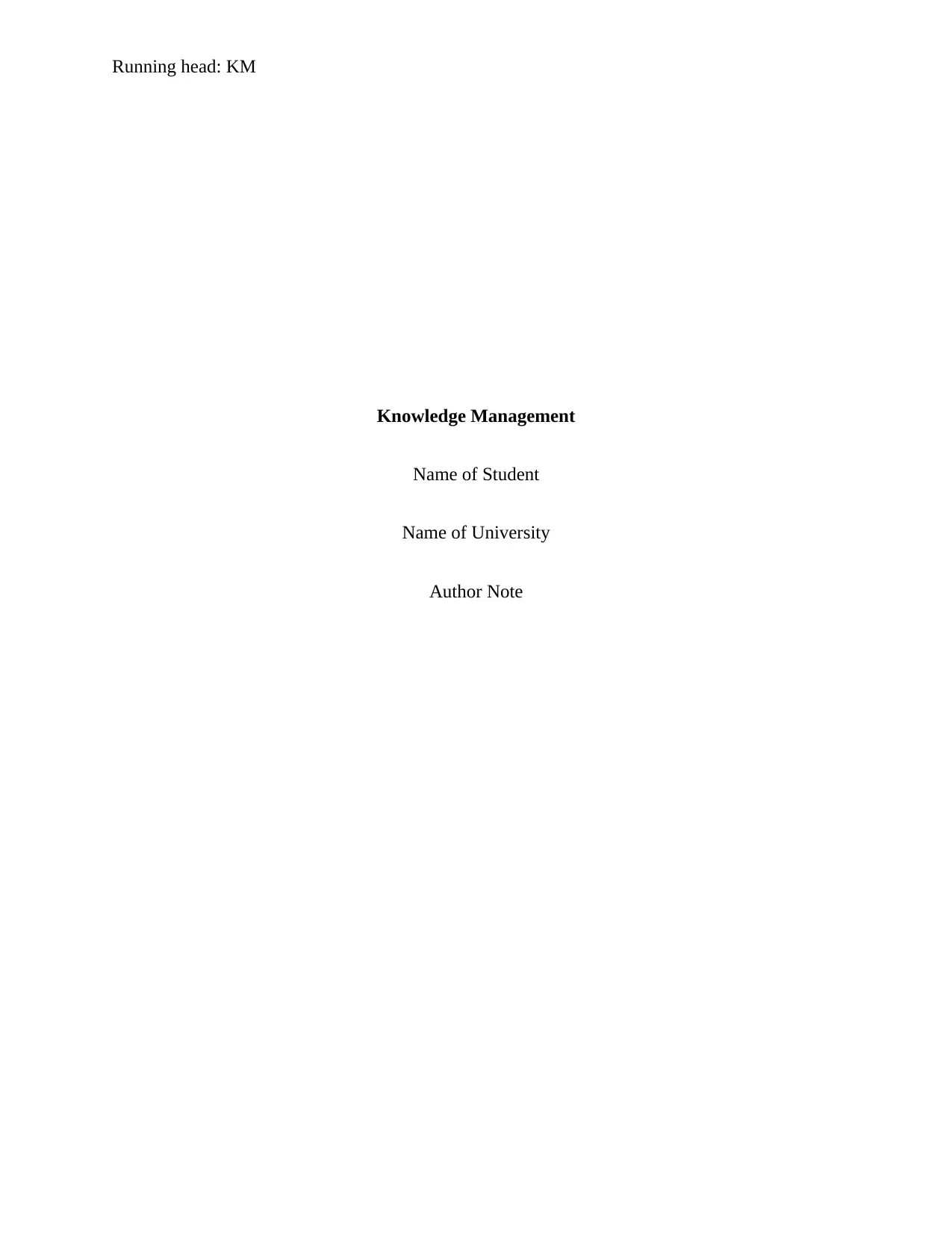
Running head: KM
Knowledge Management
Name of Student
Name of University
Author Note
Knowledge Management
Name of Student
Name of University
Author Note
Paraphrase This Document
Need a fresh take? Get an instant paraphrase of this document with our AI Paraphraser
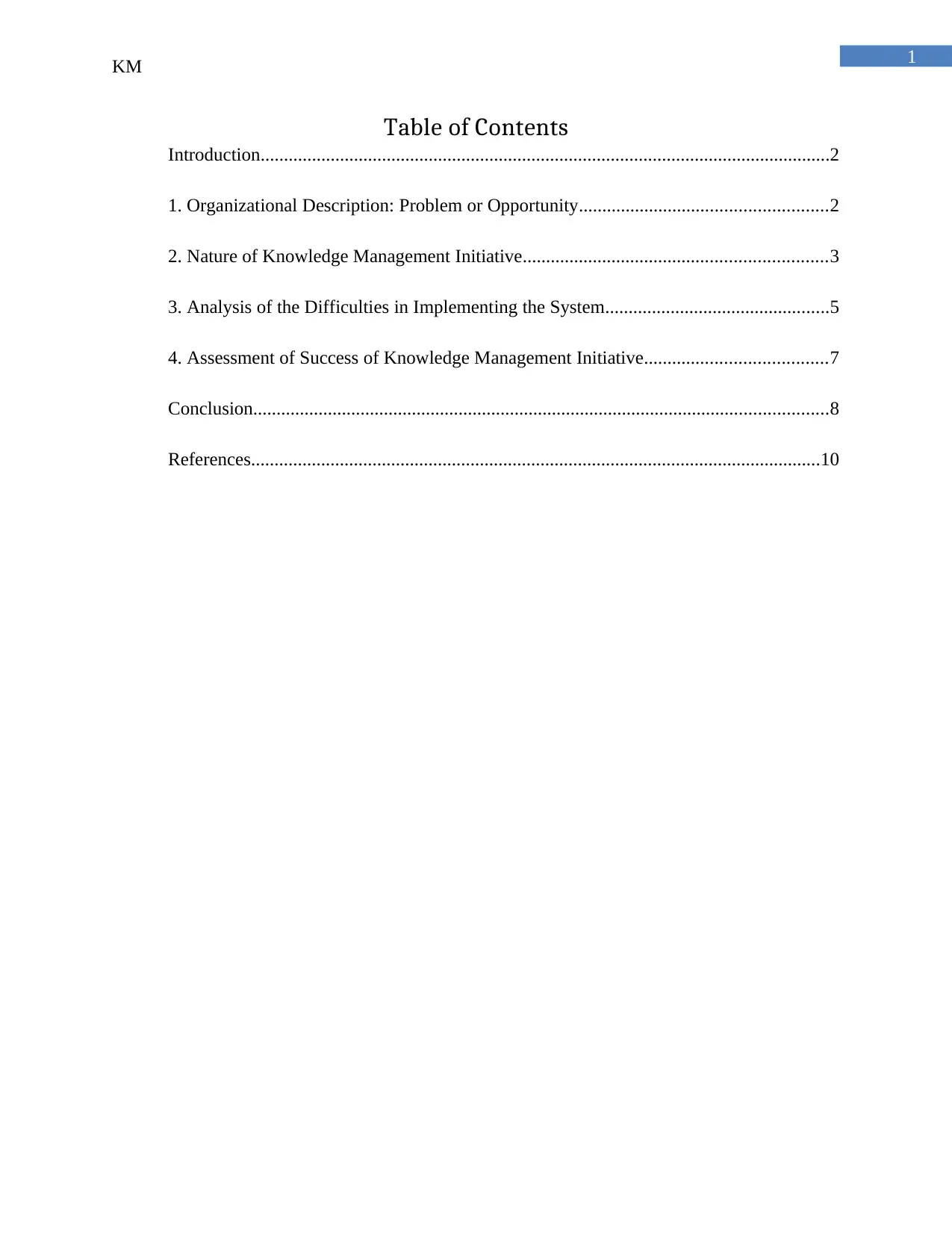
1
KM
Table of Contents
Introduction..........................................................................................................................2
1. Organizational Description: Problem or Opportunity.....................................................2
2. Nature of Knowledge Management Initiative.................................................................3
3. Analysis of the Difficulties in Implementing the System................................................5
4. Assessment of Success of Knowledge Management Initiative.......................................7
Conclusion...........................................................................................................................8
References..........................................................................................................................10
KM
Table of Contents
Introduction..........................................................................................................................2
1. Organizational Description: Problem or Opportunity.....................................................2
2. Nature of Knowledge Management Initiative.................................................................3
3. Analysis of the Difficulties in Implementing the System................................................5
4. Assessment of Success of Knowledge Management Initiative.......................................7
Conclusion...........................................................................................................................8
References..........................................................................................................................10
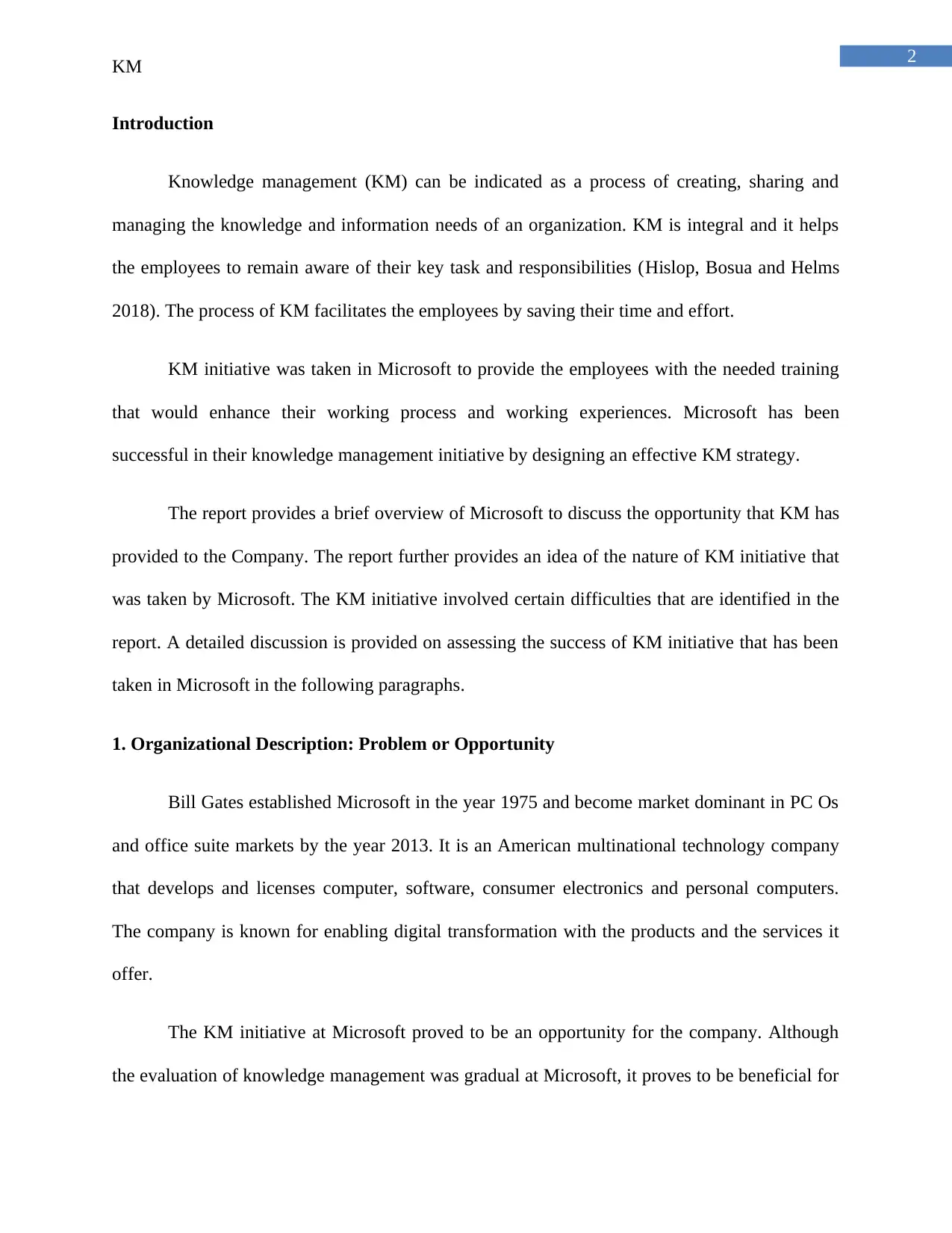
2
KM
Introduction
Knowledge management (KM) can be indicated as a process of creating, sharing and
managing the knowledge and information needs of an organization. KM is integral and it helps
the employees to remain aware of their key task and responsibilities (Hislop, Bosua and Helms
2018). The process of KM facilitates the employees by saving their time and effort.
KM initiative was taken in Microsoft to provide the employees with the needed training
that would enhance their working process and working experiences. Microsoft has been
successful in their knowledge management initiative by designing an effective KM strategy.
The report provides a brief overview of Microsoft to discuss the opportunity that KM has
provided to the Company. The report further provides an idea of the nature of KM initiative that
was taken by Microsoft. The KM initiative involved certain difficulties that are identified in the
report. A detailed discussion is provided on assessing the success of KM initiative that has been
taken in Microsoft in the following paragraphs.
1. Organizational Description: Problem or Opportunity
Bill Gates established Microsoft in the year 1975 and become market dominant in PC Os
and office suite markets by the year 2013. It is an American multinational technology company
that develops and licenses computer, software, consumer electronics and personal computers.
The company is known for enabling digital transformation with the products and the services it
offer.
The KM initiative at Microsoft proved to be an opportunity for the company. Although
the evaluation of knowledge management was gradual at Microsoft, it proves to be beneficial for
KM
Introduction
Knowledge management (KM) can be indicated as a process of creating, sharing and
managing the knowledge and information needs of an organization. KM is integral and it helps
the employees to remain aware of their key task and responsibilities (Hislop, Bosua and Helms
2018). The process of KM facilitates the employees by saving their time and effort.
KM initiative was taken in Microsoft to provide the employees with the needed training
that would enhance their working process and working experiences. Microsoft has been
successful in their knowledge management initiative by designing an effective KM strategy.
The report provides a brief overview of Microsoft to discuss the opportunity that KM has
provided to the Company. The report further provides an idea of the nature of KM initiative that
was taken by Microsoft. The KM initiative involved certain difficulties that are identified in the
report. A detailed discussion is provided on assessing the success of KM initiative that has been
taken in Microsoft in the following paragraphs.
1. Organizational Description: Problem or Opportunity
Bill Gates established Microsoft in the year 1975 and become market dominant in PC Os
and office suite markets by the year 2013. It is an American multinational technology company
that develops and licenses computer, software, consumer electronics and personal computers.
The company is known for enabling digital transformation with the products and the services it
offer.
The KM initiative at Microsoft proved to be an opportunity for the company. Although
the evaluation of knowledge management was gradual at Microsoft, it proves to be beneficial for
⊘ This is a preview!⊘
Do you want full access?
Subscribe today to unlock all pages.

Trusted by 1+ million students worldwide
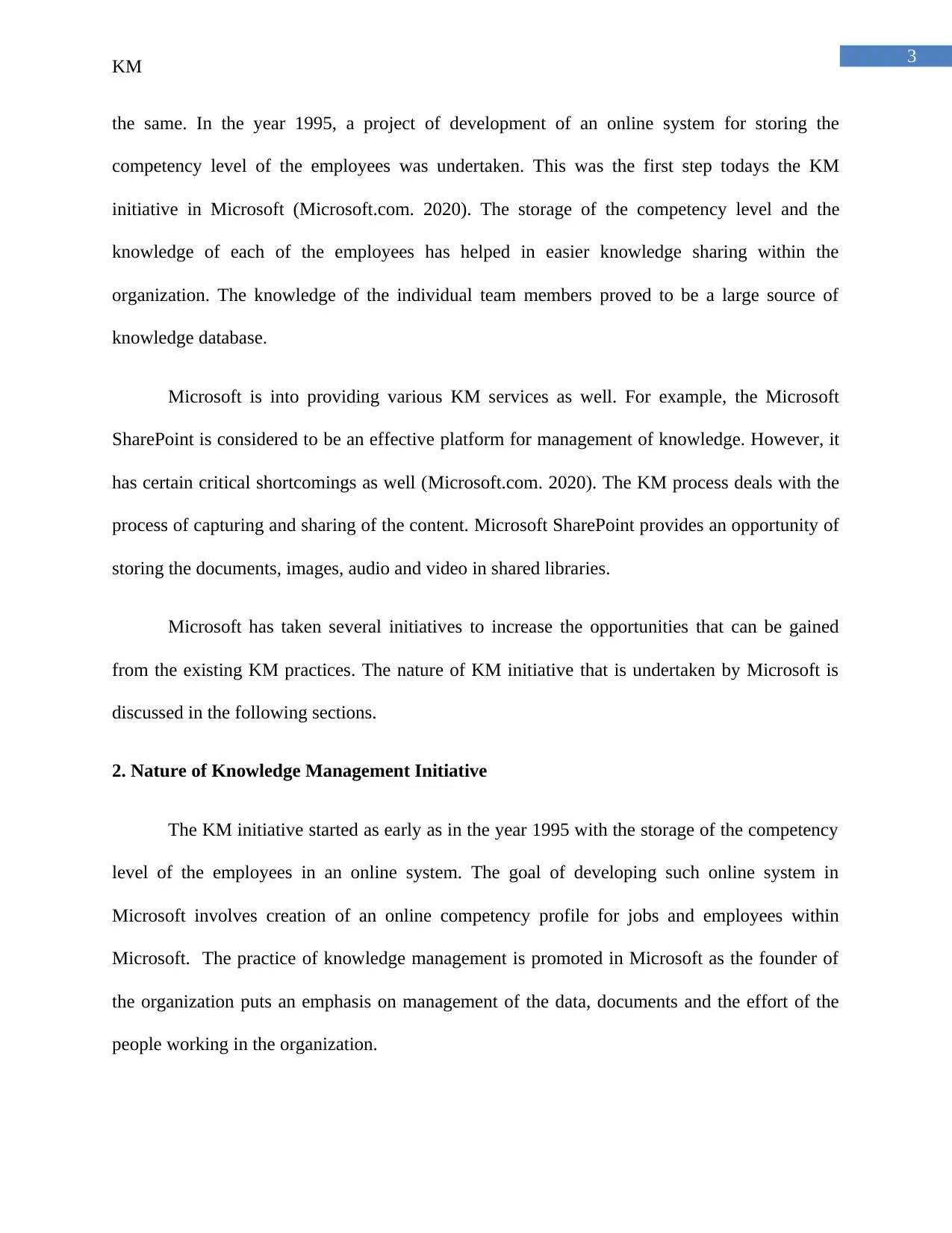
3
KM
the same. In the year 1995, a project of development of an online system for storing the
competency level of the employees was undertaken. This was the first step todays the KM
initiative in Microsoft (Microsoft.com. 2020). The storage of the competency level and the
knowledge of each of the employees has helped in easier knowledge sharing within the
organization. The knowledge of the individual team members proved to be a large source of
knowledge database.
Microsoft is into providing various KM services as well. For example, the Microsoft
SharePoint is considered to be an effective platform for management of knowledge. However, it
has certain critical shortcomings as well (Microsoft.com. 2020). The KM process deals with the
process of capturing and sharing of the content. Microsoft SharePoint provides an opportunity of
storing the documents, images, audio and video in shared libraries.
Microsoft has taken several initiatives to increase the opportunities that can be gained
from the existing KM practices. The nature of KM initiative that is undertaken by Microsoft is
discussed in the following sections.
2. Nature of Knowledge Management Initiative
The KM initiative started as early as in the year 1995 with the storage of the competency
level of the employees in an online system. The goal of developing such online system in
Microsoft involves creation of an online competency profile for jobs and employees within
Microsoft. The practice of knowledge management is promoted in Microsoft as the founder of
the organization puts an emphasis on management of the data, documents and the effort of the
people working in the organization.
KM
the same. In the year 1995, a project of development of an online system for storing the
competency level of the employees was undertaken. This was the first step todays the KM
initiative in Microsoft (Microsoft.com. 2020). The storage of the competency level and the
knowledge of each of the employees has helped in easier knowledge sharing within the
organization. The knowledge of the individual team members proved to be a large source of
knowledge database.
Microsoft is into providing various KM services as well. For example, the Microsoft
SharePoint is considered to be an effective platform for management of knowledge. However, it
has certain critical shortcomings as well (Microsoft.com. 2020). The KM process deals with the
process of capturing and sharing of the content. Microsoft SharePoint provides an opportunity of
storing the documents, images, audio and video in shared libraries.
Microsoft has taken several initiatives to increase the opportunities that can be gained
from the existing KM practices. The nature of KM initiative that is undertaken by Microsoft is
discussed in the following sections.
2. Nature of Knowledge Management Initiative
The KM initiative started as early as in the year 1995 with the storage of the competency
level of the employees in an online system. The goal of developing such online system in
Microsoft involves creation of an online competency profile for jobs and employees within
Microsoft. The practice of knowledge management is promoted in Microsoft as the founder of
the organization puts an emphasis on management of the data, documents and the effort of the
people working in the organization.
Paraphrase This Document
Need a fresh take? Get an instant paraphrase of this document with our AI Paraphraser
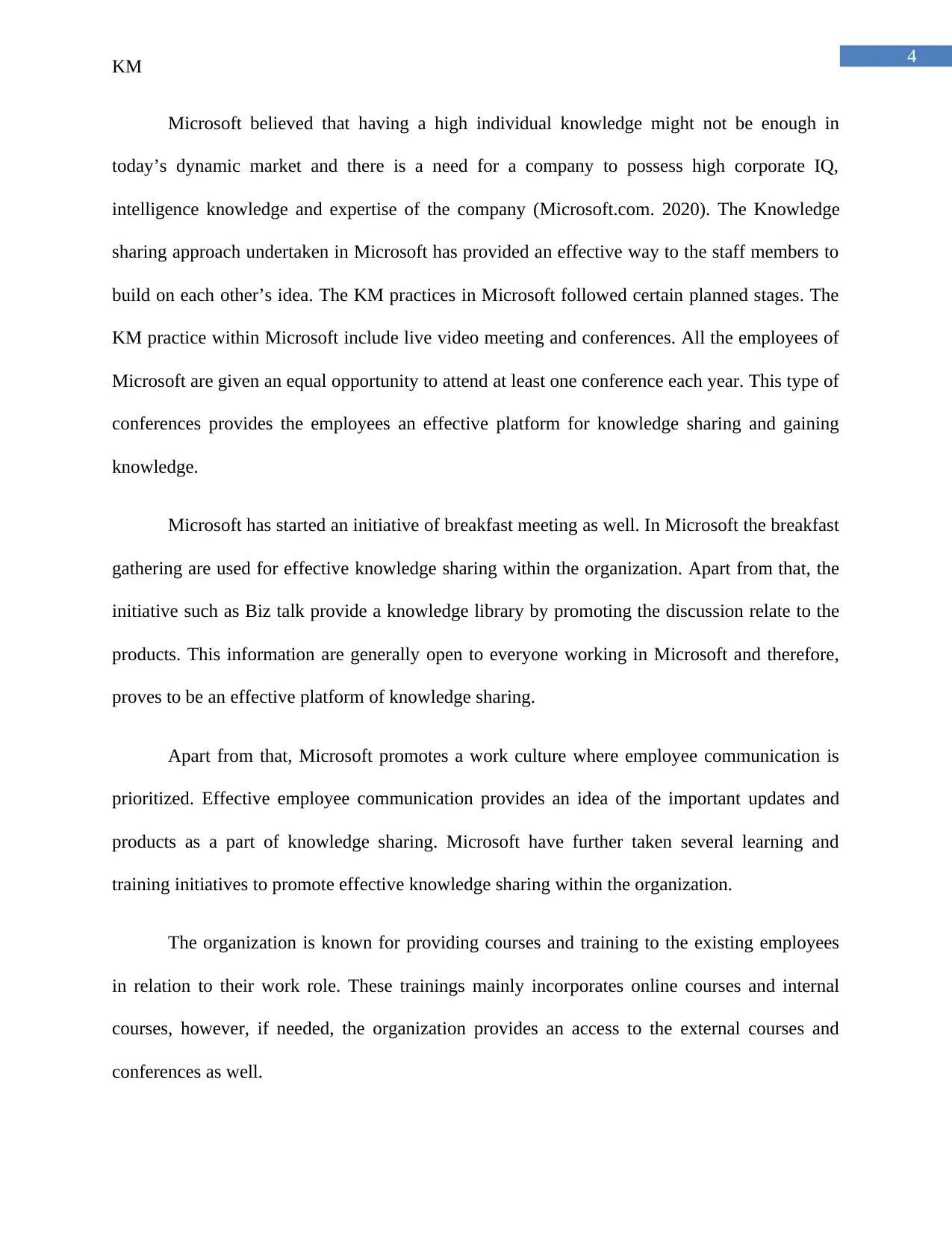
4
KM
Microsoft believed that having a high individual knowledge might not be enough in
today’s dynamic market and there is a need for a company to possess high corporate IQ,
intelligence knowledge and expertise of the company (Microsoft.com. 2020). The Knowledge
sharing approach undertaken in Microsoft has provided an effective way to the staff members to
build on each other’s idea. The KM practices in Microsoft followed certain planned stages. The
KM practice within Microsoft include live video meeting and conferences. All the employees of
Microsoft are given an equal opportunity to attend at least one conference each year. This type of
conferences provides the employees an effective platform for knowledge sharing and gaining
knowledge.
Microsoft has started an initiative of breakfast meeting as well. In Microsoft the breakfast
gathering are used for effective knowledge sharing within the organization. Apart from that, the
initiative such as Biz talk provide a knowledge library by promoting the discussion relate to the
products. This information are generally open to everyone working in Microsoft and therefore,
proves to be an effective platform of knowledge sharing.
Apart from that, Microsoft promotes a work culture where employee communication is
prioritized. Effective employee communication provides an idea of the important updates and
products as a part of knowledge sharing. Microsoft have further taken several learning and
training initiatives to promote effective knowledge sharing within the organization.
The organization is known for providing courses and training to the existing employees
in relation to their work role. These trainings mainly incorporates online courses and internal
courses, however, if needed, the organization provides an access to the external courses and
conferences as well.
KM
Microsoft believed that having a high individual knowledge might not be enough in
today’s dynamic market and there is a need for a company to possess high corporate IQ,
intelligence knowledge and expertise of the company (Microsoft.com. 2020). The Knowledge
sharing approach undertaken in Microsoft has provided an effective way to the staff members to
build on each other’s idea. The KM practices in Microsoft followed certain planned stages. The
KM practice within Microsoft include live video meeting and conferences. All the employees of
Microsoft are given an equal opportunity to attend at least one conference each year. This type of
conferences provides the employees an effective platform for knowledge sharing and gaining
knowledge.
Microsoft has started an initiative of breakfast meeting as well. In Microsoft the breakfast
gathering are used for effective knowledge sharing within the organization. Apart from that, the
initiative such as Biz talk provide a knowledge library by promoting the discussion relate to the
products. This information are generally open to everyone working in Microsoft and therefore,
proves to be an effective platform of knowledge sharing.
Apart from that, Microsoft promotes a work culture where employee communication is
prioritized. Effective employee communication provides an idea of the important updates and
products as a part of knowledge sharing. Microsoft have further taken several learning and
training initiatives to promote effective knowledge sharing within the organization.
The organization is known for providing courses and training to the existing employees
in relation to their work role. These trainings mainly incorporates online courses and internal
courses, however, if needed, the organization provides an access to the external courses and
conferences as well.
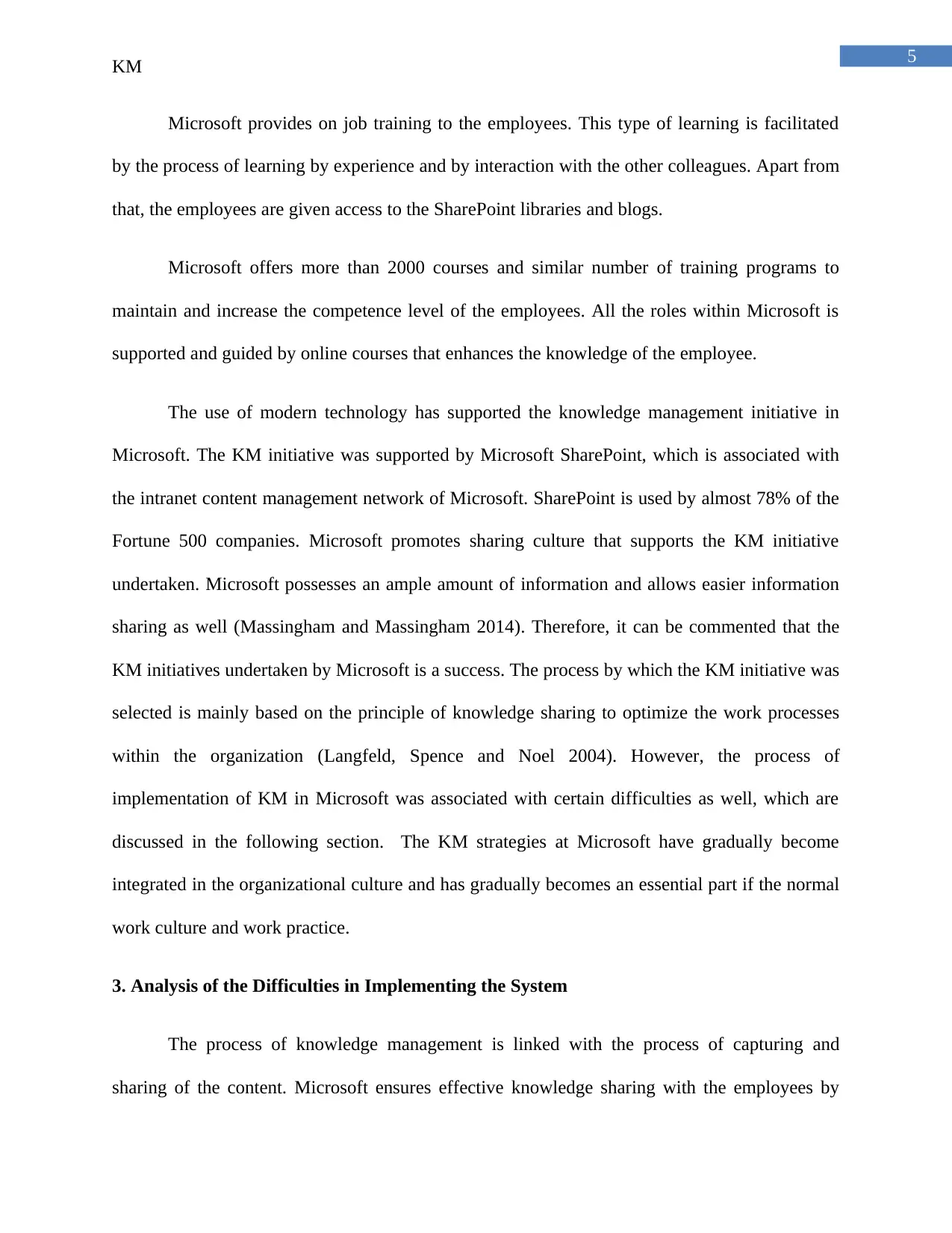
5
KM
Microsoft provides on job training to the employees. This type of learning is facilitated
by the process of learning by experience and by interaction with the other colleagues. Apart from
that, the employees are given access to the SharePoint libraries and blogs.
Microsoft offers more than 2000 courses and similar number of training programs to
maintain and increase the competence level of the employees. All the roles within Microsoft is
supported and guided by online courses that enhances the knowledge of the employee.
The use of modern technology has supported the knowledge management initiative in
Microsoft. The KM initiative was supported by Microsoft SharePoint, which is associated with
the intranet content management network of Microsoft. SharePoint is used by almost 78% of the
Fortune 500 companies. Microsoft promotes sharing culture that supports the KM initiative
undertaken. Microsoft possesses an ample amount of information and allows easier information
sharing as well (Massingham and Massingham 2014). Therefore, it can be commented that the
KM initiatives undertaken by Microsoft is a success. The process by which the KM initiative was
selected is mainly based on the principle of knowledge sharing to optimize the work processes
within the organization (Langfeld, Spence and Noel 2004). However, the process of
implementation of KM in Microsoft was associated with certain difficulties as well, which are
discussed in the following section. The KM strategies at Microsoft have gradually become
integrated in the organizational culture and has gradually becomes an essential part if the normal
work culture and work practice.
3. Analysis of the Difficulties in Implementing the System
The process of knowledge management is linked with the process of capturing and
sharing of the content. Microsoft ensures effective knowledge sharing with the employees by
KM
Microsoft provides on job training to the employees. This type of learning is facilitated
by the process of learning by experience and by interaction with the other colleagues. Apart from
that, the employees are given access to the SharePoint libraries and blogs.
Microsoft offers more than 2000 courses and similar number of training programs to
maintain and increase the competence level of the employees. All the roles within Microsoft is
supported and guided by online courses that enhances the knowledge of the employee.
The use of modern technology has supported the knowledge management initiative in
Microsoft. The KM initiative was supported by Microsoft SharePoint, which is associated with
the intranet content management network of Microsoft. SharePoint is used by almost 78% of the
Fortune 500 companies. Microsoft promotes sharing culture that supports the KM initiative
undertaken. Microsoft possesses an ample amount of information and allows easier information
sharing as well (Massingham and Massingham 2014). Therefore, it can be commented that the
KM initiatives undertaken by Microsoft is a success. The process by which the KM initiative was
selected is mainly based on the principle of knowledge sharing to optimize the work processes
within the organization (Langfeld, Spence and Noel 2004). However, the process of
implementation of KM in Microsoft was associated with certain difficulties as well, which are
discussed in the following section. The KM strategies at Microsoft have gradually become
integrated in the organizational culture and has gradually becomes an essential part if the normal
work culture and work practice.
3. Analysis of the Difficulties in Implementing the System
The process of knowledge management is linked with the process of capturing and
sharing of the content. Microsoft ensures effective knowledge sharing with the employees by
⊘ This is a preview!⊘
Do you want full access?
Subscribe today to unlock all pages.

Trusted by 1+ million students worldwide
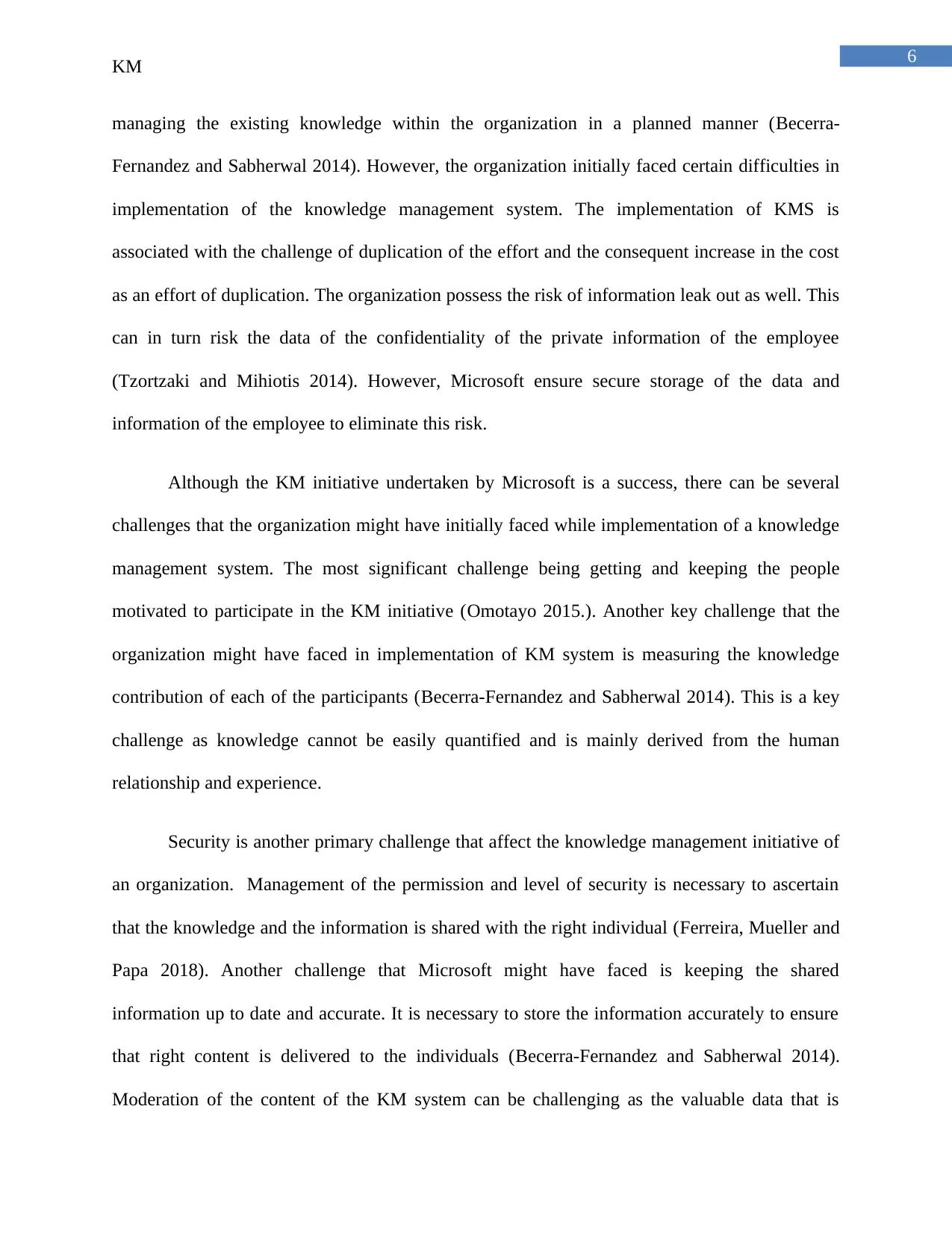
6
KM
managing the existing knowledge within the organization in a planned manner (Becerra-
Fernandez and Sabherwal 2014). However, the organization initially faced certain difficulties in
implementation of the knowledge management system. The implementation of KMS is
associated with the challenge of duplication of the effort and the consequent increase in the cost
as an effort of duplication. The organization possess the risk of information leak out as well. This
can in turn risk the data of the confidentiality of the private information of the employee
(Tzortzaki and Mihiotis 2014). However, Microsoft ensure secure storage of the data and
information of the employee to eliminate this risk.
Although the KM initiative undertaken by Microsoft is a success, there can be several
challenges that the organization might have initially faced while implementation of a knowledge
management system. The most significant challenge being getting and keeping the people
motivated to participate in the KM initiative (Omotayo 2015.). Another key challenge that the
organization might have faced in implementation of KM system is measuring the knowledge
contribution of each of the participants (Becerra-Fernandez and Sabherwal 2014). This is a key
challenge as knowledge cannot be easily quantified and is mainly derived from the human
relationship and experience.
Security is another primary challenge that affect the knowledge management initiative of
an organization. Management of the permission and level of security is necessary to ascertain
that the knowledge and the information is shared with the right individual (Ferreira, Mueller and
Papa 2018). Another challenge that Microsoft might have faced is keeping the shared
information up to date and accurate. It is necessary to store the information accurately to ensure
that right content is delivered to the individuals (Becerra-Fernandez and Sabherwal 2014).
Moderation of the content of the KM system can be challenging as the valuable data that is
KM
managing the existing knowledge within the organization in a planned manner (Becerra-
Fernandez and Sabherwal 2014). However, the organization initially faced certain difficulties in
implementation of the knowledge management system. The implementation of KMS is
associated with the challenge of duplication of the effort and the consequent increase in the cost
as an effort of duplication. The organization possess the risk of information leak out as well. This
can in turn risk the data of the confidentiality of the private information of the employee
(Tzortzaki and Mihiotis 2014). However, Microsoft ensure secure storage of the data and
information of the employee to eliminate this risk.
Although the KM initiative undertaken by Microsoft is a success, there can be several
challenges that the organization might have initially faced while implementation of a knowledge
management system. The most significant challenge being getting and keeping the people
motivated to participate in the KM initiative (Omotayo 2015.). Another key challenge that the
organization might have faced in implementation of KM system is measuring the knowledge
contribution of each of the participants (Becerra-Fernandez and Sabherwal 2014). This is a key
challenge as knowledge cannot be easily quantified and is mainly derived from the human
relationship and experience.
Security is another primary challenge that affect the knowledge management initiative of
an organization. Management of the permission and level of security is necessary to ascertain
that the knowledge and the information is shared with the right individual (Ferreira, Mueller and
Papa 2018). Another challenge that Microsoft might have faced is keeping the shared
information up to date and accurate. It is necessary to store the information accurately to ensure
that right content is delivered to the individuals (Becerra-Fernandez and Sabherwal 2014).
Moderation of the content of the KM system can be challenging as the valuable data that is
Paraphrase This Document
Need a fresh take? Get an instant paraphrase of this document with our AI Paraphraser
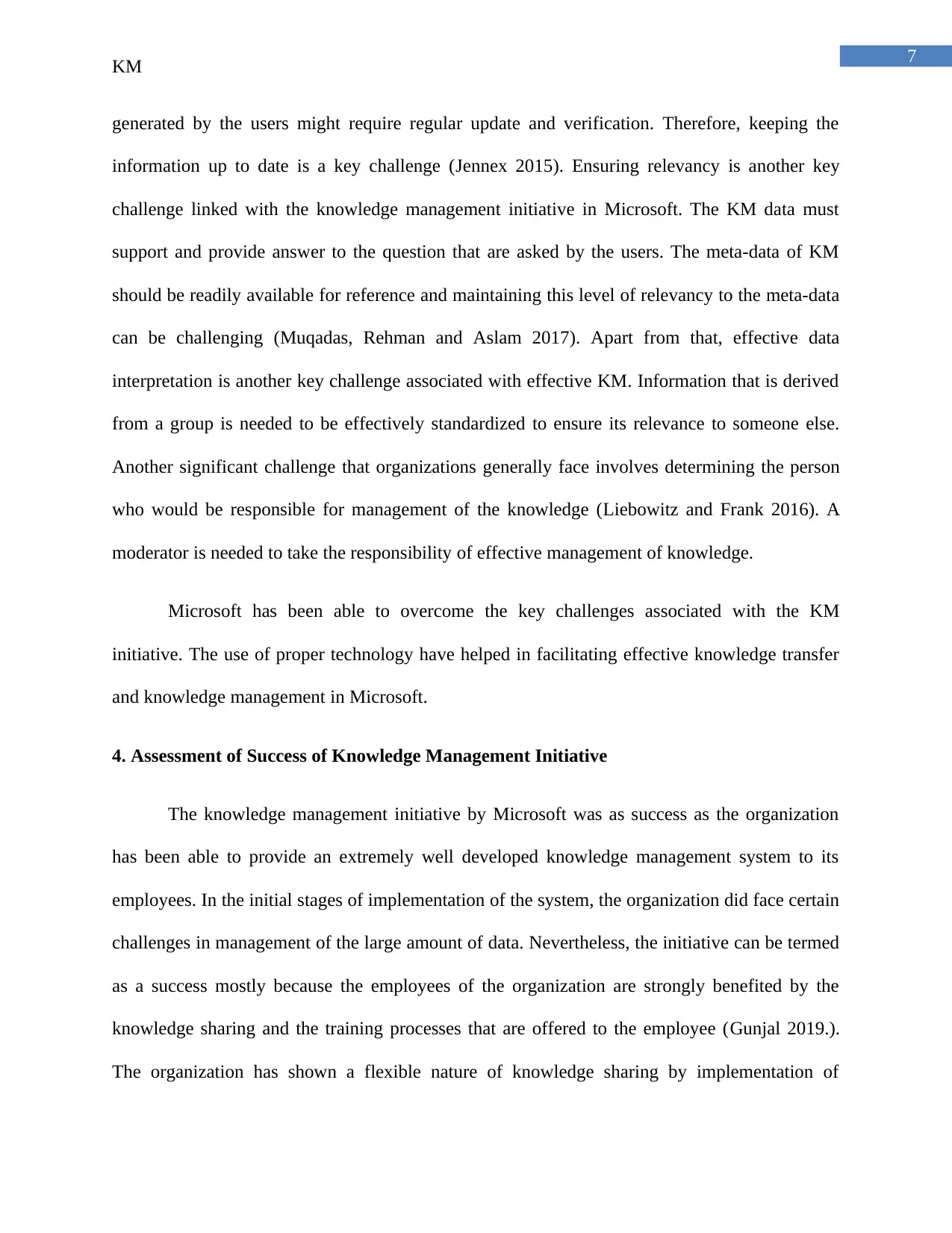
7
KM
generated by the users might require regular update and verification. Therefore, keeping the
information up to date is a key challenge (Jennex 2015). Ensuring relevancy is another key
challenge linked with the knowledge management initiative in Microsoft. The KM data must
support and provide answer to the question that are asked by the users. The meta-data of KM
should be readily available for reference and maintaining this level of relevancy to the meta-data
can be challenging (Muqadas, Rehman and Aslam 2017). Apart from that, effective data
interpretation is another key challenge associated with effective KM. Information that is derived
from a group is needed to be effectively standardized to ensure its relevance to someone else.
Another significant challenge that organizations generally face involves determining the person
who would be responsible for management of the knowledge (Liebowitz and Frank 2016). A
moderator is needed to take the responsibility of effective management of knowledge.
Microsoft has been able to overcome the key challenges associated with the KM
initiative. The use of proper technology have helped in facilitating effective knowledge transfer
and knowledge management in Microsoft.
4. Assessment of Success of Knowledge Management Initiative
The knowledge management initiative by Microsoft was as success as the organization
has been able to provide an extremely well developed knowledge management system to its
employees. In the initial stages of implementation of the system, the organization did face certain
challenges in management of the large amount of data. Nevertheless, the initiative can be termed
as a success mostly because the employees of the organization are strongly benefited by the
knowledge sharing and the training processes that are offered to the employee (Gunjal 2019.).
The organization has shown a flexible nature of knowledge sharing by implementation of
KM
generated by the users might require regular update and verification. Therefore, keeping the
information up to date is a key challenge (Jennex 2015). Ensuring relevancy is another key
challenge linked with the knowledge management initiative in Microsoft. The KM data must
support and provide answer to the question that are asked by the users. The meta-data of KM
should be readily available for reference and maintaining this level of relevancy to the meta-data
can be challenging (Muqadas, Rehman and Aslam 2017). Apart from that, effective data
interpretation is another key challenge associated with effective KM. Information that is derived
from a group is needed to be effectively standardized to ensure its relevance to someone else.
Another significant challenge that organizations generally face involves determining the person
who would be responsible for management of the knowledge (Liebowitz and Frank 2016). A
moderator is needed to take the responsibility of effective management of knowledge.
Microsoft has been able to overcome the key challenges associated with the KM
initiative. The use of proper technology have helped in facilitating effective knowledge transfer
and knowledge management in Microsoft.
4. Assessment of Success of Knowledge Management Initiative
The knowledge management initiative by Microsoft was as success as the organization
has been able to provide an extremely well developed knowledge management system to its
employees. In the initial stages of implementation of the system, the organization did face certain
challenges in management of the large amount of data. Nevertheless, the initiative can be termed
as a success mostly because the employees of the organization are strongly benefited by the
knowledge sharing and the training processes that are offered to the employee (Gunjal 2019.).
The organization has shown a flexible nature of knowledge sharing by implementation of
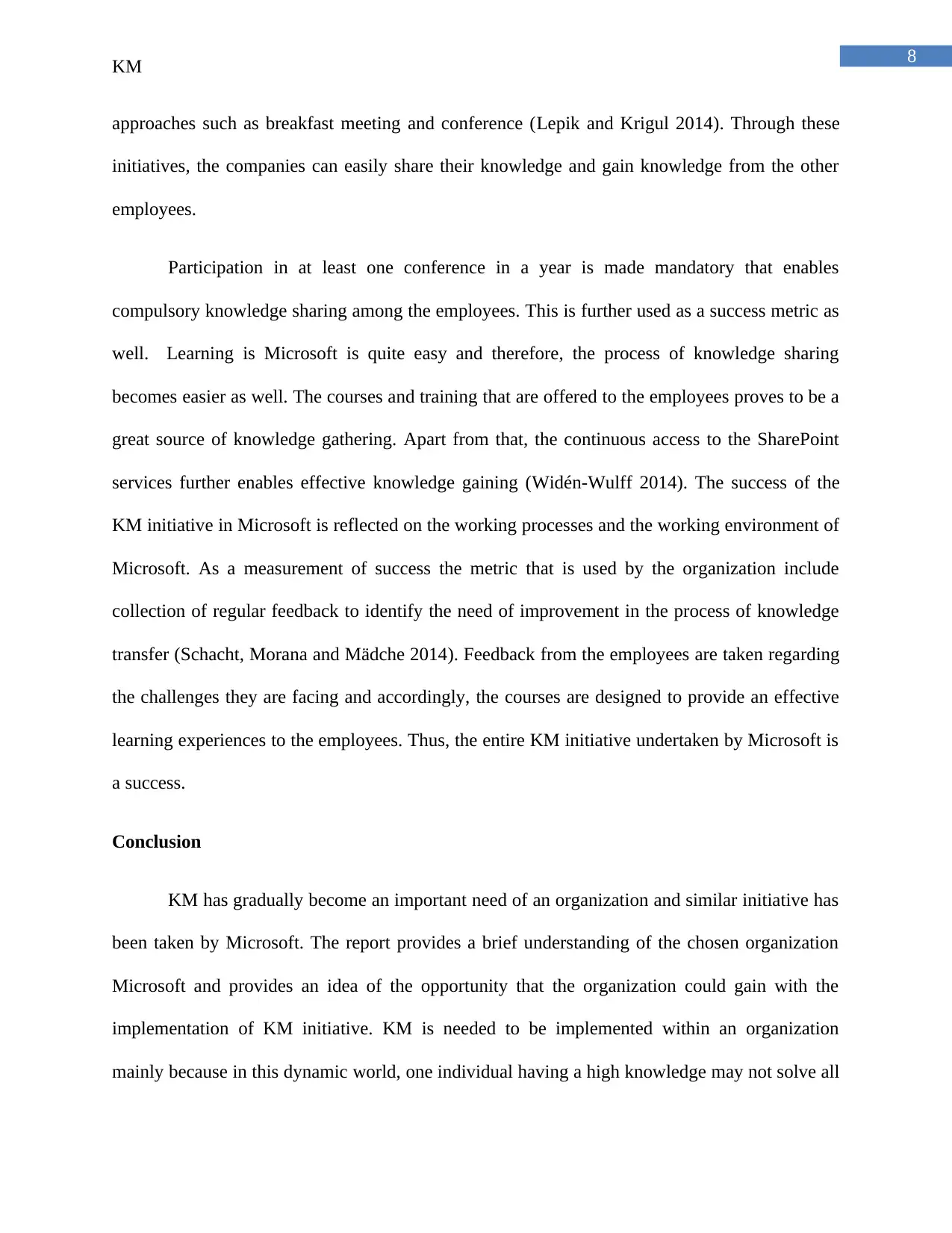
8
KM
approaches such as breakfast meeting and conference (Lepik and Krigul 2014). Through these
initiatives, the companies can easily share their knowledge and gain knowledge from the other
employees.
Participation in at least one conference in a year is made mandatory that enables
compulsory knowledge sharing among the employees. This is further used as a success metric as
well. Learning is Microsoft is quite easy and therefore, the process of knowledge sharing
becomes easier as well. The courses and training that are offered to the employees proves to be a
great source of knowledge gathering. Apart from that, the continuous access to the SharePoint
services further enables effective knowledge gaining (Widén-Wulff 2014). The success of the
KM initiative in Microsoft is reflected on the working processes and the working environment of
Microsoft. As a measurement of success the metric that is used by the organization include
collection of regular feedback to identify the need of improvement in the process of knowledge
transfer (Schacht, Morana and Mädche 2014). Feedback from the employees are taken regarding
the challenges they are facing and accordingly, the courses are designed to provide an effective
learning experiences to the employees. Thus, the entire KM initiative undertaken by Microsoft is
a success.
Conclusion
KM has gradually become an important need of an organization and similar initiative has
been taken by Microsoft. The report provides a brief understanding of the chosen organization
Microsoft and provides an idea of the opportunity that the organization could gain with the
implementation of KM initiative. KM is needed to be implemented within an organization
mainly because in this dynamic world, one individual having a high knowledge may not solve all
KM
approaches such as breakfast meeting and conference (Lepik and Krigul 2014). Through these
initiatives, the companies can easily share their knowledge and gain knowledge from the other
employees.
Participation in at least one conference in a year is made mandatory that enables
compulsory knowledge sharing among the employees. This is further used as a success metric as
well. Learning is Microsoft is quite easy and therefore, the process of knowledge sharing
becomes easier as well. The courses and training that are offered to the employees proves to be a
great source of knowledge gathering. Apart from that, the continuous access to the SharePoint
services further enables effective knowledge gaining (Widén-Wulff 2014). The success of the
KM initiative in Microsoft is reflected on the working processes and the working environment of
Microsoft. As a measurement of success the metric that is used by the organization include
collection of regular feedback to identify the need of improvement in the process of knowledge
transfer (Schacht, Morana and Mädche 2014). Feedback from the employees are taken regarding
the challenges they are facing and accordingly, the courses are designed to provide an effective
learning experiences to the employees. Thus, the entire KM initiative undertaken by Microsoft is
a success.
Conclusion
KM has gradually become an important need of an organization and similar initiative has
been taken by Microsoft. The report provides a brief understanding of the chosen organization
Microsoft and provides an idea of the opportunity that the organization could gain with the
implementation of KM initiative. KM is needed to be implemented within an organization
mainly because in this dynamic world, one individual having a high knowledge may not solve all
⊘ This is a preview!⊘
Do you want full access?
Subscribe today to unlock all pages.

Trusted by 1+ million students worldwide
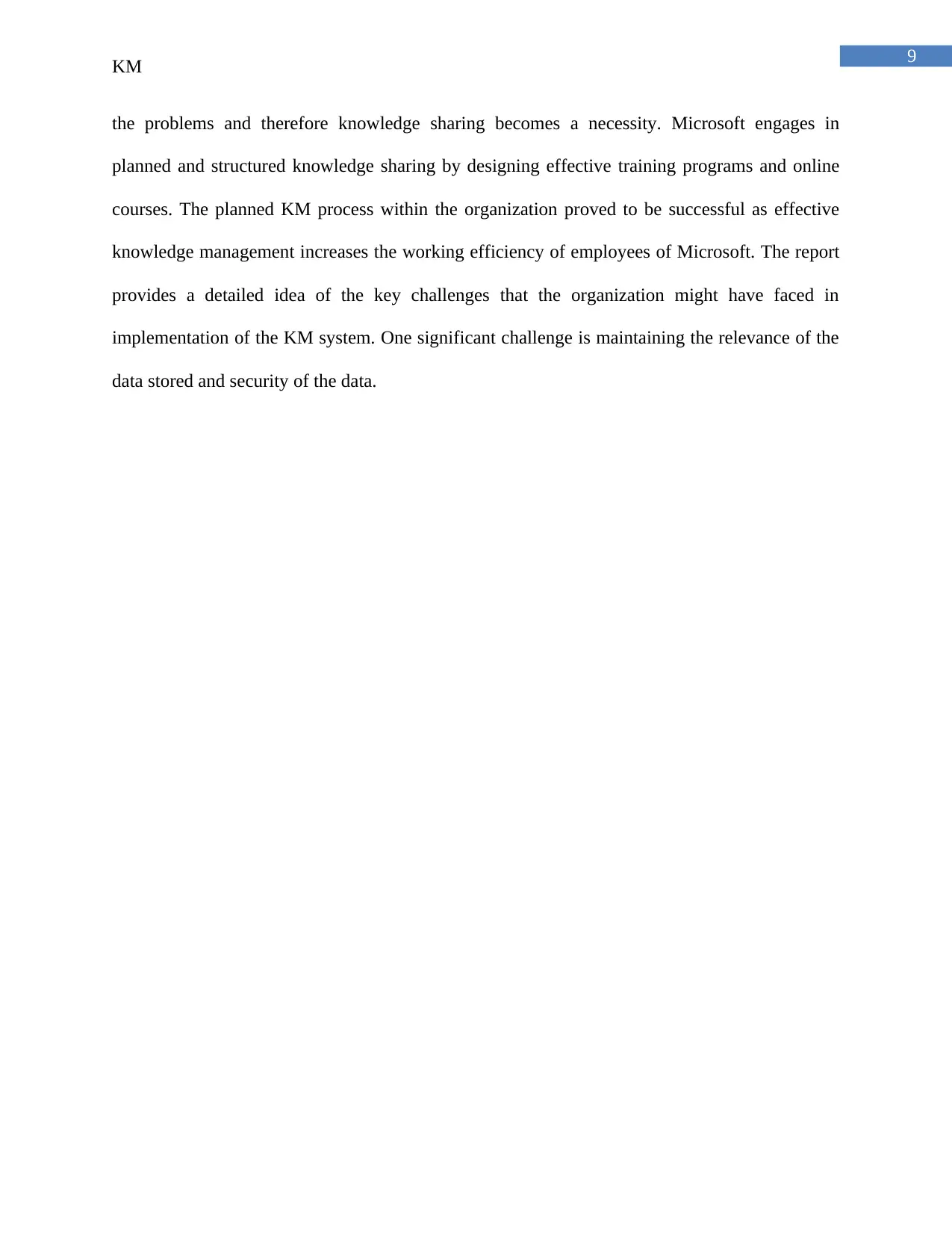
9
KM
the problems and therefore knowledge sharing becomes a necessity. Microsoft engages in
planned and structured knowledge sharing by designing effective training programs and online
courses. The planned KM process within the organization proved to be successful as effective
knowledge management increases the working efficiency of employees of Microsoft. The report
provides a detailed idea of the key challenges that the organization might have faced in
implementation of the KM system. One significant challenge is maintaining the relevance of the
data stored and security of the data.
KM
the problems and therefore knowledge sharing becomes a necessity. Microsoft engages in
planned and structured knowledge sharing by designing effective training programs and online
courses. The planned KM process within the organization proved to be successful as effective
knowledge management increases the working efficiency of employees of Microsoft. The report
provides a detailed idea of the key challenges that the organization might have faced in
implementation of the KM system. One significant challenge is maintaining the relevance of the
data stored and security of the data.
Paraphrase This Document
Need a fresh take? Get an instant paraphrase of this document with our AI Paraphraser
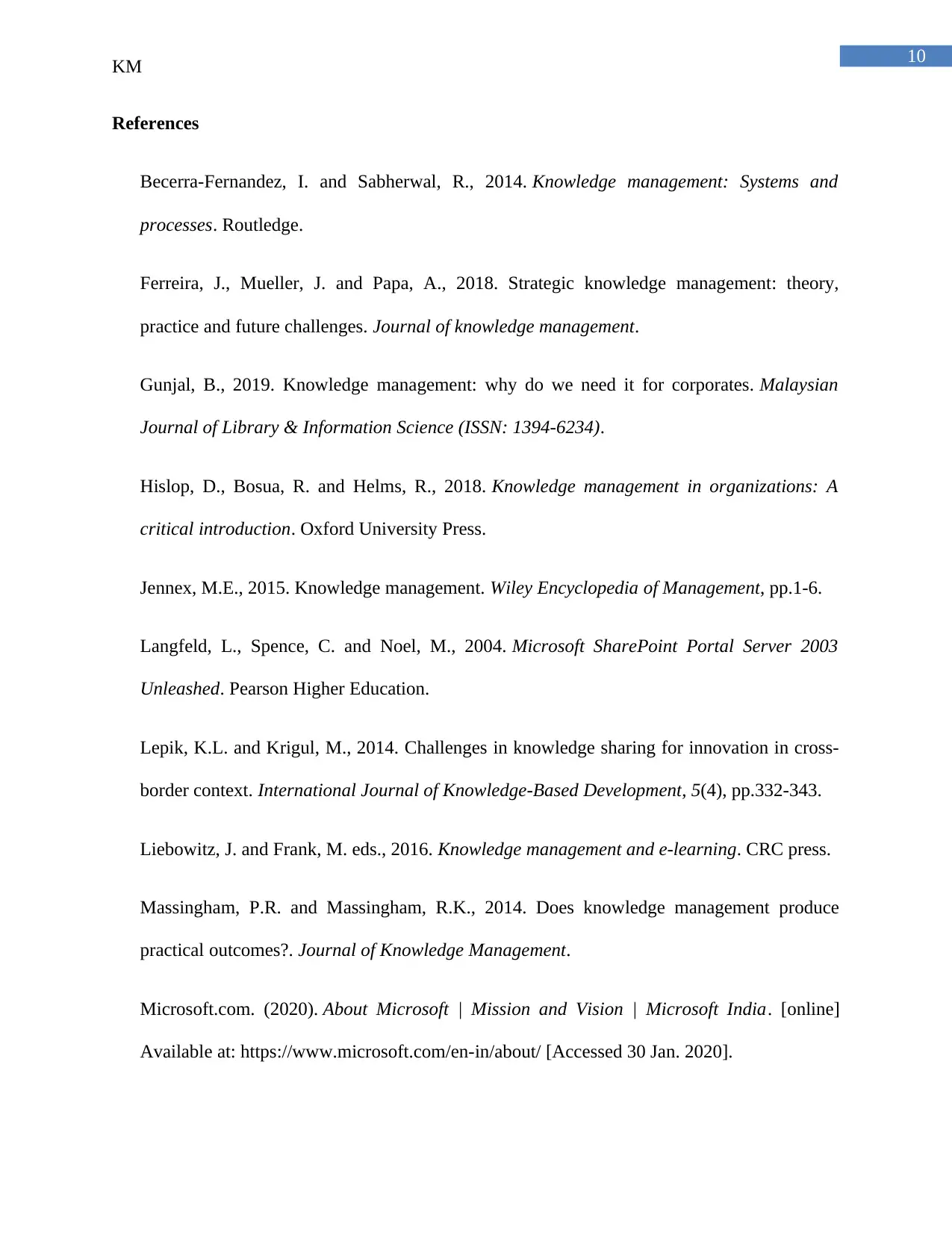
10
KM
References
Becerra-Fernandez, I. and Sabherwal, R., 2014. Knowledge management: Systems and
processes. Routledge.
Ferreira, J., Mueller, J. and Papa, A., 2018. Strategic knowledge management: theory,
practice and future challenges. Journal of knowledge management.
Gunjal, B., 2019. Knowledge management: why do we need it for corporates. Malaysian
Journal of Library & Information Science (ISSN: 1394-6234).
Hislop, D., Bosua, R. and Helms, R., 2018. Knowledge management in organizations: A
critical introduction. Oxford University Press.
Jennex, M.E., 2015. Knowledge management. Wiley Encyclopedia of Management, pp.1-6.
Langfeld, L., Spence, C. and Noel, M., 2004. Microsoft SharePoint Portal Server 2003
Unleashed. Pearson Higher Education.
Lepik, K.L. and Krigul, M., 2014. Challenges in knowledge sharing for innovation in cross-
border context. International Journal of Knowledge-Based Development, 5(4), pp.332-343.
Liebowitz, J. and Frank, M. eds., 2016. Knowledge management and e-learning. CRC press.
Massingham, P.R. and Massingham, R.K., 2014. Does knowledge management produce
practical outcomes?. Journal of Knowledge Management.
Microsoft.com. (2020). About Microsoft | Mission and Vision | Microsoft India. [online]
Available at: https://www.microsoft.com/en-in/about/ [Accessed 30 Jan. 2020].
KM
References
Becerra-Fernandez, I. and Sabherwal, R., 2014. Knowledge management: Systems and
processes. Routledge.
Ferreira, J., Mueller, J. and Papa, A., 2018. Strategic knowledge management: theory,
practice and future challenges. Journal of knowledge management.
Gunjal, B., 2019. Knowledge management: why do we need it for corporates. Malaysian
Journal of Library & Information Science (ISSN: 1394-6234).
Hislop, D., Bosua, R. and Helms, R., 2018. Knowledge management in organizations: A
critical introduction. Oxford University Press.
Jennex, M.E., 2015. Knowledge management. Wiley Encyclopedia of Management, pp.1-6.
Langfeld, L., Spence, C. and Noel, M., 2004. Microsoft SharePoint Portal Server 2003
Unleashed. Pearson Higher Education.
Lepik, K.L. and Krigul, M., 2014. Challenges in knowledge sharing for innovation in cross-
border context. International Journal of Knowledge-Based Development, 5(4), pp.332-343.
Liebowitz, J. and Frank, M. eds., 2016. Knowledge management and e-learning. CRC press.
Massingham, P.R. and Massingham, R.K., 2014. Does knowledge management produce
practical outcomes?. Journal of Knowledge Management.
Microsoft.com. (2020). About Microsoft | Mission and Vision | Microsoft India. [online]
Available at: https://www.microsoft.com/en-in/about/ [Accessed 30 Jan. 2020].
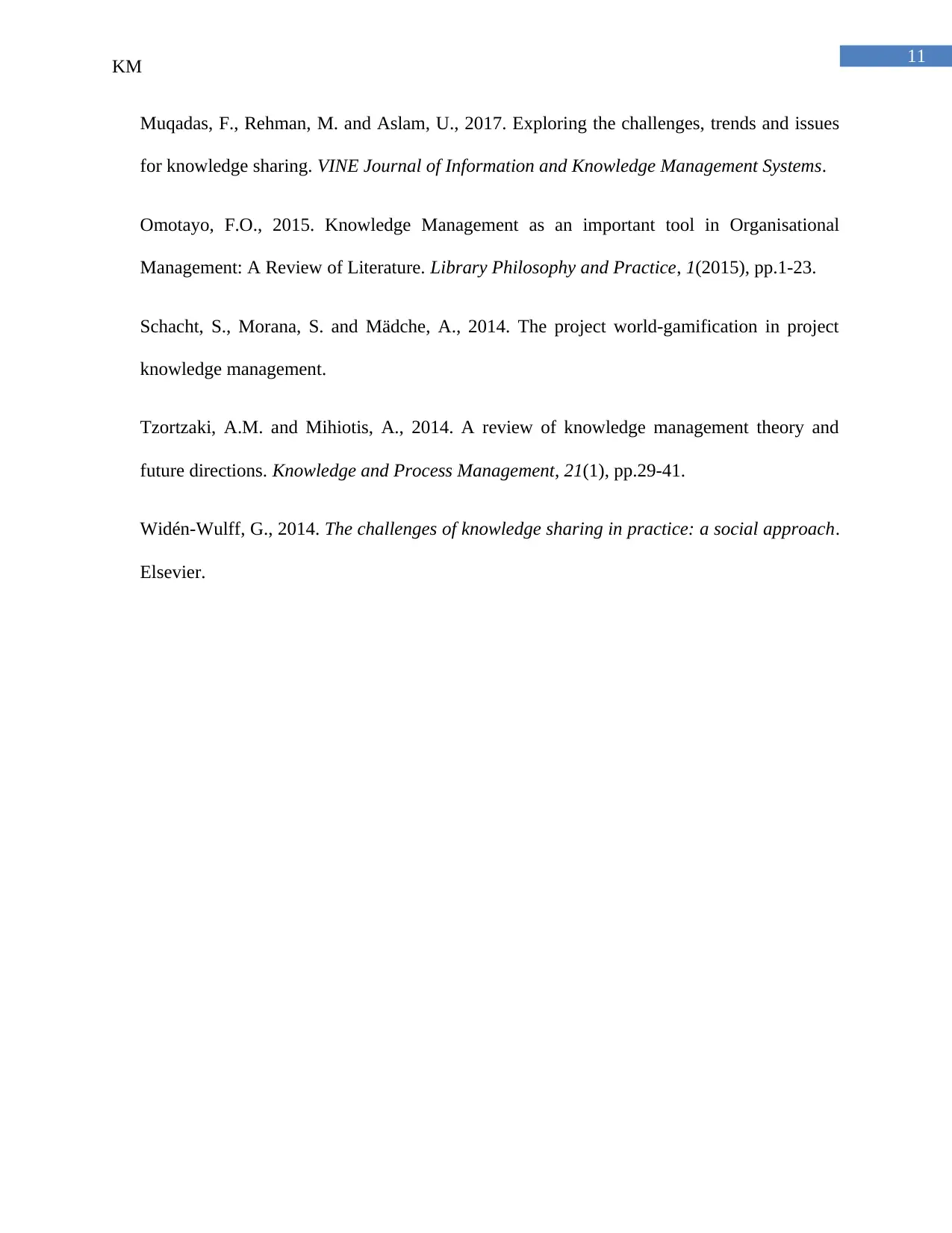
11
KM
Muqadas, F., Rehman, M. and Aslam, U., 2017. Exploring the challenges, trends and issues
for knowledge sharing. VINE Journal of Information and Knowledge Management Systems.
Omotayo, F.O., 2015. Knowledge Management as an important tool in Organisational
Management: A Review of Literature. Library Philosophy and Practice, 1(2015), pp.1-23.
Schacht, S., Morana, S. and Mädche, A., 2014. The project world-gamification in project
knowledge management.
Tzortzaki, A.M. and Mihiotis, A., 2014. A review of knowledge management theory and
future directions. Knowledge and Process Management, 21(1), pp.29-41.
Widén-Wulff, G., 2014. The challenges of knowledge sharing in practice: a social approach.
Elsevier.
KM
Muqadas, F., Rehman, M. and Aslam, U., 2017. Exploring the challenges, trends and issues
for knowledge sharing. VINE Journal of Information and Knowledge Management Systems.
Omotayo, F.O., 2015. Knowledge Management as an important tool in Organisational
Management: A Review of Literature. Library Philosophy and Practice, 1(2015), pp.1-23.
Schacht, S., Morana, S. and Mädche, A., 2014. The project world-gamification in project
knowledge management.
Tzortzaki, A.M. and Mihiotis, A., 2014. A review of knowledge management theory and
future directions. Knowledge and Process Management, 21(1), pp.29-41.
Widén-Wulff, G., 2014. The challenges of knowledge sharing in practice: a social approach.
Elsevier.
⊘ This is a preview!⊘
Do you want full access?
Subscribe today to unlock all pages.

Trusted by 1+ million students worldwide
1 out of 12
Related Documents
Your All-in-One AI-Powered Toolkit for Academic Success.
+13062052269
info@desklib.com
Available 24*7 on WhatsApp / Email
![[object Object]](/_next/static/media/star-bottom.7253800d.svg)
Unlock your academic potential
Copyright © 2020–2026 A2Z Services. All Rights Reserved. Developed and managed by ZUCOL.




